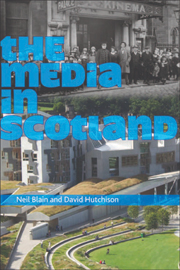6 - Broadcasting: From Birth to Devolution … and Beyond
from The Historical Context
Published online by Cambridge University Press: 05 August 2013
Summary
INTRODUCTION
Prior to the establishment of a Scottish Parliament in July 1999, there were increasing calls from some quarters that in addition to acquiring legislative powers on matters relating to health, education, economic development, law, transport, and the arts, a substantial element of authority over broadcasting should also be wrested from Westminster control. Delivering the Edinburgh Festival's MacTaggart Lecture in 1996, the then Director-General of the BBC, John Birt, hinted that the BBC would ‘be sensitive to the creation of a Scottish Parliament’ (Smith 1997: 30). For some, this appeared to signal that, with the re-shaping of the UK political landscape, would come also a re-structuring of the centralised approach to broadcasting, which has dominated in Britain since the inception of the BBC in 1922. However, post-devolution the degree of ‘sensitivity’ accorded the broadcasting institutions and the concomitant needs of their audience has yet to be fully realised, within the contexts of both day-to-day programming output and the potential benefits to the wider economy.
- Type
- Chapter
- Information
- The Media in Scotland , pp. 87 - 104Publisher: Edinburgh University PressPrint publication year: 2008



